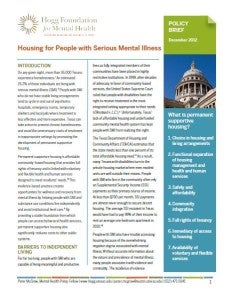Policy Recommendation: Housing for People with Serious Mental Illness
Introduction
On any given night, more than 36,000 Texans experience homelessness.i An estimated 26.2% of these individuals are living with serious mental illness (SMI).ii People with SMI who do not have stable living arrangements tend to cycle in and out of psychiatric hospitals, emergency rooms, temporary shelters and local jails where treatment is less effective and more expensive. Texas can take action to prevent chronic homelessness and avoid the unnecessary costs of treatment in inappropriate settings by promoting the development of permanent supportive housing.
Permanent supportive housing is affordable community-based housing that provides full rights of tenancy and is linked with voluntary and flexible health and human services designed to meet residents’ needs. This evidence-based practice creates opportunities for wellness and recovery from mental illness by helping people with SMI and substance use conditions live independently and avoid institutional level care. By providing a stable foundation from which people can access behavioral health services, permanent supportive housing also significantly reduces costs to other public systems.
Recommendations for Promoting Permanent Supportive Housing in Texas
Implementation of the following recommendations will help increase the availability of permanent supportive housing for Texans living with mental illness:
- Support the Department of State Health Services’ (DSHS) legislative appropriation exceptional item request relating to supportive housing. This request will provide a mix of short and long-term supportive housing funds for individuals with histories of utilizing behavioral health services in the most expensive settings. It will also allow Texas to pursue a Medicaid state plan option, targeting specific populations with individualized service plans in conjunction with affordable housing.
- Increase funding for affordable housing by restoring the Housing Trust Fund, the only state funding source dedicated to developing affordable housing for low-income families.
- Encourage continued collaboration between TDHCA, DSHS and the Health and Human Services Commission to ensure that the housing and health service needs of people with SMI are met and that all possible opportunities for increasing the availability of mental health services in affordable housing settings through the state’s 1115 Medicaid transformation waiver are pursued.
Download the document (with footnotes).

